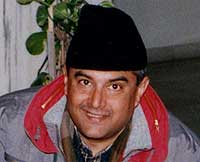Trained as a power engineer in the former Soviet Union, Dipak Gyawali studied resource economics from Berkeley. He is the Minister for Water Resources. Excerpts from an interview in Gorkhapatra.
 You have returned to the ministry as minister. How does that feel?
You have returned to the ministry as minister. How does that feel?
When I was at the Water Resources Ministry 16 years ago, the staff used to be professionally motivated. This time, I found them demoralised due to excessive politicisation. I am trying to change that. In 2011, we will be completing 100 years of electric power generation in Nepal. My goal is to make cheap and reliable power available. By cheap, I don't mean reducing tariff. A number of agreements are in place which make this option difficult. We will have to make arrangements for cheaper electricity and making it available to industries. We can also generate cheap electricity by developing efficient infrastructure. Privatisation doesn't necessarily bring efficiency, competition does. A commodity like electricity should be partially privatised to promote competition.
Can the Maoist problem be resolved through dialogue?
First of all, the Maoist leadership should prove that its cadre are under its control. If a political negotiation is to take place with the Maoist leadership, the armed cadre must be listening to them. You can hold political dialogue only with political side. To deal with those who are carrying arms, you must use arms to bring them to dialogue.
How do you analyse Maoists' strategy of destruction?
The Maoists have adopted the Hegelian philosophy. They are destroying power plants and productivity itself. This will not take us towards socialism by enhancing productivity. There are a number of contradictions within the Maoist fold, they must correct these.
How do you see the political future of the Maoists?
I think the book, Future of Maoism by noted Marxist thinker, Samir Amin, is still relevant in case of Nepal. Amin called the USSR "bureaucratic socialism", and referred to the Maoist model in China as a good socialist path. But it was only after Deng Xiao Ping turned China on a strong, capitalist productive road that China has now turned into an economic superpower. Nepali leftists and Maoists, too, need to understand this. If they continue the tradition of worshipping neo-feudal elements as was seen in case of Pol Pot no achievement is possible.
When will this government hold elections?
His Majesty has asked us to focus on holding elections. We want early elections, but because of climate and other reasons elections can only be held during April-May or December-January. But local elections can be held at any time. My personal preference is to hold local elections first for the development of local leadership followed by general elections as early as possible.
But aren't there political obstacles?
There are two or three hurdles. The prime minister has said elections can be held within two hours of the political parties saying that they are ready to face polls. They are citing two reasons for not going to the polls. The insurgency may only be 40 percent of the problem, but 60 percent of their problem is that they have got nothing to tell the people.
What is your impression of the king?
I had an opportunity to know him when I was with the King Mahendra Trust for Nature Conservation (KMTNC). Chairing its board meetings he used to listen to all, but took decisions himself. He had a "no nonsense" attitude and took criticism seriously. I have felt that he doesn't see democracy as a free-for-all system. He wants things managed. During my last meeting, His Majesty said the invoking of Article 127 of the constitution was a compulsion and that he had not acted unconstitutionally.


